- Home
- Jay Bonansinga
Perfect Victim Page 2
Perfect Victim Read online
Page 2
Out of the corner of her eye, in the row of mirrors, she glimpsed the reflection of her assailant. He was doubled over now, ass against the back wall, cringing with pain. Face obscured by shadow, he wore an anachronistic old stovepipe hat—a midnight-black topper, as Barbie’s grandfather might have called it once upon a time—along with the black suit of a mortician. In fact, even amid her debilitating terror, Barbie Allison latched onto an odd stray thought: He looks like a mad chimney sweep.
He was also digging something out of his pocket. A gun? A knife? Barbie crawled toward the door in a panic.
She never made it.
A viselike grip closed around her ankles, and she screamed then, a primal cry for help, a last-ditch shriek for deliverance that bounced off the tile walls and reverberated out into the corridors, reaching countless ears. “Help! Somebody help!”
The man in black calmly and relentlessly dragged her back into the shadows, a slipstream of charred BO trailing after him, Barbie kicking and clawing at the floor. She would not give up. She would not give this monster the opportunity to rape her. She would chew his testicles off before she would allow him to rape her.
The odor of menthol filled Barbie’s nostrils as a cloth was pressed down over her mouth. Outside the bathroom door, frantic footsteps were approaching. The jangle of keys. The sound of the locked door rattling.
The light was fading, Barbie’s flesh cold and tingling, her mouth so cottony now she could hardly open it. She felt herself sliding back along the tiles, and it felt as though she were slipping into a warm bath of darkness. There was a second door in the ladies’ room, a service door in the corner, and Barbie saw it through the gauze of her dwindling vision. The man in black was prying it open in slow, blurry motion—a time traveler from some Dickensian nightmare.
Barbie was dragged into darkness, her last conscious thought a prayer to some vague supreme being that she wouldn’t be raped.
She needn’t have worried.
The man in the hat had something completely different in mind for her.
PART I
The Archetype
What we seek, we shall find.
—EMERSON
The true motive behind most multiple murders is a hall of mirrors—an insatiable beast feeding only on itself.
—ULYSSES GROVE, The Psychopathological
Archetype: Toward a Statistical Model
ONE
“This morning we’re going to build the perfect serial killer.”
The man at the front of the room made his pronouncement in a measured voice, unaware of the tremendous portents in his words. He was a trim, light-skinned African American in a smartly tailored houndstooth sport coat, black V-neck, and jeans. His deep-set eyes and sculpted features revealed very little, and about the only thing that differentiated him from a stylish hip-hop A&R man was the laminated FBI faculty ID clipped to his outer pocket.
He turned and scratched a phrase in large letters across the blackboard—
THE ARCHETYPE
—as the hushed, scuttling sound of note-taking filled the oblong classroom.
“Webster’s defines archetype as the model or the original version of something.” He clapped chalk dust from his hands, raising tiny puffs of yellow smoke as he casually surveyed the room. “That’s not exactly what I’m talking about here. And I’m definitely not talking about some B-movie version of the serial murderer. You can forget all that bogus mythology. What I’m talking about here is the mathematical average. The standard. The monolithic murderer.”
Fourteen eager recruits sat in orderly rows before Ulysses Grove, twelve men and two women, bathed in stark fluorescent light. Each bore the telltale formality of the junior field agent on the come, from the Brooks Brothers jackets draped neatly over chair backs down to the meticulously buffed Florsheims. They all listened intently to the dapper instructor’s words—all of them, that is, except one.
Edith Drinkwater sat next to the windows, near the reeking coffee service, chewing her pencil eraser. She was a short, stout, copper-skinned Haitian girl in an ill-fitting black dress, with tight cornrows of inky black braids curving down the back of her skull like ribs of armor. She had the plush curves of her mother—the matronly hips and bosom—which for years had been concealed behind the starched breastplates of boardroom dress codes. But when your cleavage starts a few centimeters south of your chin, there’s not much you can do in the way of disguise.
The youngest field agent in the room, Drinkwater had difficulty focusing on the dapper instructor at the blackboard due to an undercurrent of emotions ebbing and flowing through her. She felt a vague distrust for the mostly male faculty here at the Academy—the old patriarchy was alive and well at Quantico—and yet at the same time she wanted so badly to rise through its ranks, to get to the good part—the actual casework.
Back in the mid-nineties, fresh out of junior college with a BS in Law Enforcement, Drinkwater got a job as a radio dispatcher for the Cicero, Illinois PD’s Violent Crimes Division, a position for which she was woefully overqualified. After burning out on the edgy ennui of the gig, she spent a few years in the private sector—first as an investigator for American Family Insurance, and later as a skip tracer for Maksym Bail Bonds in West Chicago. All of it conspired to make Drinkwater want more. She was too smart, too tough, and too talented to be the token black in an understaffed suburban bond shop.
“Okay, let’s start building the killer,” Agent Grove was saying, pacing across the front of the room with his own bad self all decked out in Armani denim.
Drinkwater noticed Grove’s mismatched eyes from the back of the room—one eye, the left, looked droopy, unfocused, and dead—and she wondered about the visual acuity in that left eye. Would they let her in the Academy with an eye like that? She knew all about the incident that had nearly blinded Grove two years ago. In fact, she knew more about Ulysses Grove, the only African American man ever to reach the status of senior consulting profiler in Bureau history, than most field agents who had spent months on cases with him. She made it her business to know such things.
“First question,” Grove said, looking around the class. “Man or woman? Quick. Anybody.”
Drinkwater heard somebody murmur, “Man…what else?”
Grove was nodding. “That’s right, men are dogs, and they also thrill-kill about eighty-nine percent more than women. What about age, race, religion?”
A portly black man with thick glasses in the third row raised his hand. “Middle-aged, white, Christian, red state Republican probably.”
Scattered laughter. Grove acknowledged the joke with a terse nod. “Very good. The archetype is forty-two, to be exact. He’s married and has a family. Usually in some middle-management job. Very few serial killers are drifters, as the movies would have you believe. On the other hand very few are geniuses. On the surface, the archetype is a bland, ordinary, run-of-the-mill person with no outward eccentricities. That’s too easy, though. Let’s go back to the perp’s childhood and the old chestnut, the homicidal trinity. The early childhood attributes of tomorrow’s serial killer are…what? Anybody. Give me the three traits of the junior sociopath.”
Around the room scattered arms levitated. Edith Drinkwater put her hand up.
Grove gave her a nod. “The nice lady in black over here.”
“Bed-wetting, fire starting, and animal torture.” Drinkwater uttered the words with the plainspoken confidence of a country lawyer resting her case, as Grove proffered a pleasant smile in response.
“Excellent, thank you.” He turned and wrote the three traits on the board, the sound of his chalk rasping and squeaking.
BED WETTER
FIRE STARTER
ANIMAL TORTURER
“This formula is overused,” Grove went on. He turned and scanned the room as he spewed his rapid-fire lesson. “It’s probably a little misleading, maybe even a little apocryphal, but it’s still to this day a good starting point. Sixty-two percent of all children between t
he ages of six and ten wet the bed on a regular basis, and they’re not gonna kill anybody. But when you add a fascination with fire you reduce the percentage to eleven percent.”
Throughout the classroom pens madly skritched and scrawled the numbers.
“You know where I’m going with this.” Grove paused for dramatic effect. “If our little problem child also has a propensity to pull the wings off of flies, he’s part of a much narrower band of the population. We’re talking about maybe point-zero-five percent that will pee the bed, play with matches, and kick the dog. Why is this percentage important? Anybody? What’s the big deal with point-zero-five percent?”
Fewer hands shot up. A couple in the back. And, of course, Drinkwater.
Grove grinned at Drinkwater. “You’re on a roll, go ahead.”
“It’s basically the same percentage of the human race that will murder somebody.”
“Very good. Now let’s push it further. Let’s say a huge percentage of that point-zero-five percent will kill out of passion or opportunity. Cuckolded husbands, drive-by initiates, robberies gone bad. That’s not our boy.”
Grove paused again. He played his gaze across the room, and for a brief instant Drinkwater thought he was going to say, “Boo!” Ulysses Grove had that effect on people. Something behind his dark, almond-shaped eyes hinted at volatile chemicals being mixed.
Not surprisingly, many of the students had entire MySpace pages devoted to speculations about Special Agent Grove’s mysterious personal history. He had been instrumental in more infamous homicide closures than any other single employee of the Bureau, including Melvin Purvis and J. Edgar Hoover combined, and yet he seemed like a major flake. One rumormonger swore up and down that Grove was the reincarnated spirit of some African witch doctor. Most believed there was something mystical about the man’s intuition, but Edith had a feeling the only mystical thing about Ulysses Grove was his ability to manipulate the media, play politics at the Bureau, and maybe even use people to get ahead, to close cases, to build his legend.
Right now, in fact, the legend was turning with a dramatic flourish and pulling down a small projection screen on which a gun-range silhouette was pasted. “Our boy fits into a much smaller shard of that murderous pie chart,” Grove said, jerking a thumb at the silhouette, then shooting a sidelong glance at the class.
Drinkwater stared at the paper effigy. She had seen similar silhouettes many times. The black, featureless cutout was rendered with the simplicity of an international symbol for PERSON. Depicted from the waist up, overlaid against an intricate crosshair bull’s-eye, it looked like an inverted cast-iron skillet.
“We’re talking about one hundredth of one percent of that point-zero-five percent.” Grove indicated the black oval head and rounded rectangle shoulders.
Drinkwater knew target silhouettes well. She had happily riddled many of them with .44 caliber holes over the years. At the Cicero police academy she had won a trophy in the quick-draw contest, managing to get her Colt Desert Eagle out of her shoulder holster in 1.5 seconds, then squeezing off eight rounds over the course of another 4.2 seconds, five of them head shots. But today, for some reason, the target looked strange to Drinkwater.
At the front of the room Grove posed another question: “What we’re talking about here is a person who will kill out of…what?”
Only Drinkwater’s hand went up.
Grove gave her a nod. “Go for it.”
“They’ll kill out of need.”
“Define need,” Grove said.
She looked at the target silhouette, that big bulbous black head like a dead lightbulb. “Need…in terms of…like addiction.”
Grove nodded. “That’s not bad. But it’s more than a controlled substance to feed an addiction, it’s fuel for the fantasy. The killing is actually secondary. What do I mean by that?”
Drinkwater didn’t exactly get what he meant by that.
Neither did anybody else.
“The murder serves a purpose not unlike pornography,” Grove explained. “This guy—our mathematical average, our every-killer if you want to call him that—he kills to feed that furnace.”
Pens scribbled notes across the room. But Drinkwater could not tear her gaze from that silhouette. Something about it was profoundly bothersome.
“What is this furnace anyway?” Grove scanned the room, looking for a participant other than Drinkwater. “Anybody, what is it?”
“Sadism?”
Grove nodded at the Pakistani gentleman in the second row, the one with the bow tie and eager-beaver expression. “Interesting but not exactly correct, not for our archetype. Somebody else take a crack.”
“Cruelty,” another voice suggested.
Grove shook his head. “Actually, cruelty is more of a baroque, external modifier. When I say furnace I’m talking about something fundamental, the source of the fantasy—the source—somebody else?
Nobody said anything.
Drinkwater stared at that black bulbous outline, that perfectly generic figure. “Ego.”
“Excuse me?” Grove glanced at Drinkwater with a half smile. “Say again?”
“Ego.”
“Give the lady a gold star, that’s exactly right. Hubris, ego. It’s that Nietzschean superhero comic book in his head.” Grove walked over to the target. He reached up and ran the tip of his index finger around the contours of the silhouette. “When you perfect victim away the fantasy, our typical killer here murders out of the need to dominate. To be superior. That’s where the torture component comes in.”
More scribbling.
Grove cocked his head at the silhouette. “Yes, ladies and gentlemen, our boy’s a torturer. Most are. Even physical positioning echoes the ego. Somebody tell me what I mean by that. The physical positioning echoing the ego component.”
Drinkwater looked up, didn’t even raise her hand. “You’re talking about the missionary position.”
Uneasy laughter.
Grove stopped smiling. “Go on.”
“Man on top,” Drinkwater said.
“That’s right…and what else?”
Drinkwater looked at the silhouette. “He needs to do it to them slowly.”
“Good, what else.”
“He needs to have eye contact.”
The class got quiet then. Grove nodded. He started down the row toward Drinkwater’s chair in the back. “Interesting. Why, though? Why eye contact?”
Drinkwater took a deep breath. At the age of eleven she had been raped by her stepfather. It happened late one night in a tractor shed out behind the Robert Chambers housing project.
After a long pause she said, “Because he needs to see the desolation in your eyes.”
Now the class was stone silent. Some of them stared at the floor. Most realized Drinkwater had said “your” instead of “their” as Grove approached her desk. He gave her an encouraging smile. “Ms. Drinkwater, you go to the head of the class.”
“He needs to see it,” she reiterated softly with a level, unblinking gaze.
Drinkwater was raped during a lightning storm, in the midst of a blackout. For most of her life, right up until the year she went through some heavy therapy, she only remembered the flicker of cold, icy light on her stepfather’s grizzled face while he thrust himself into her.
“Let’s go ahead and take a break,” Grove suggested, his overly cheerful voice finally breaking the spell. “We’ll pick it up after lunch.”
Chairs squeaked. Voices murmured with relief. Drinkwater let out a sigh and gathered her things, feeling Grove’s silent benevolent presence beside her like a phantom.
Even as she made her way out of the room she felt him watching her.
TWO
That evening, just after sunset, an inexplicably large cloud of gypsy moths formed around the giant sodium lights that blazed down on the Dixie Boy truck stop out on Highway 264 east of Greenville, North Carolina. Of the genus Lymantria, the gypsy moth is the color of toasted almonds, and features delicate, p
apery wings the consistency of snakeskin. Close up, a single moth is quite lovely, but when coalesced into a massive swarm they can take down a two-hundred-year-old oak or rival a biological attack of noxious gas.
In the thirty-one-year history of that dilapidated roadside complex, nobody had ever seen such a thing. And these people were not unaccustomed to bug infestations; every summer, Greenville becomes the mosquito capital of the Old South—“skeeter season,” the old-timers call June down here—but this? This was something else altogether.
By 7 P.M., the density and volume of insects churning around those oblong overhead vapor lights reached the level of desert sirocco. From a distance, it looked as though the air was billowing with thick brown smoke. The moth cloud sparkled and undulated with its wheezing, dry-husk roar of feathery wings ticking and pinging against the glowing chevrons. Third-shift mechanics came out of their grease pits to watch. Busboys and fry cooks emerged from the main building and stood in awe, wiping their hands in towels, eyes gaping.
One person who was present that night thought of Revelations.
She watched the moth storm from inside the two open rear doors of her Kenworth eighteen-wheeler, fingering the tiny gold-plated crucifix around her sinewy neck. Karen Wanda Finnerty had just finished unloading a pallet full of raw coffee beans for the Dixie Boy grill, and now was fixing to get back on the road. A rawboned woman with a platinum blond dye job and forearms strong enough to crack walnuts, Karen had been a gypsy trucker for most of her adult life. Not only did the freedom of the open road appeal to her, but the lifestyle seemed a healthy way to rebel against her strict Pentecostal childhood. She was fully assimilated now, but those old Bible stories died hard, as did the marks left by the lashes of her father’s belt.
Then from the smoke came locusts on the earth and they were given power like the power of scorpions, she thought as she watched the pulsating thunderhead of bugs swarming around the lights.

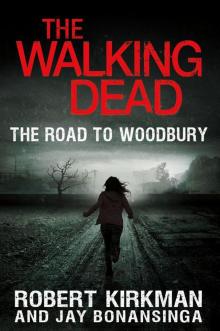 The Walking Dead: The Road to Woodbury
The Walking Dead: The Road to Woodbury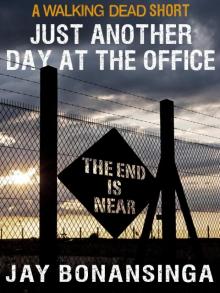 Just Another Day at the Office
Just Another Day at the Office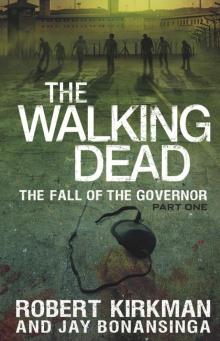 The Fall of the Governor: Part One
The Fall of the Governor: Part One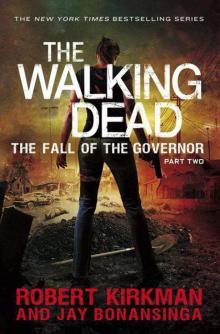 The Walking Dead: The Fall of the Governor: Part Two
The Walking Dead: The Fall of the Governor: Part Two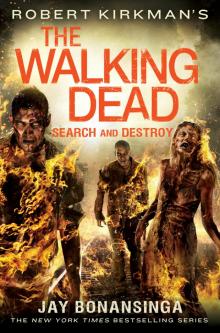 Search and Destroy
Search and Destroy Invasion
Invasion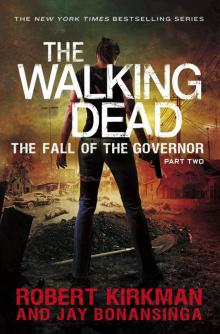 The Fall of the Governor: Part Two
The Fall of the Governor: Part Two The Walking Dead Collection
The Walking Dead Collection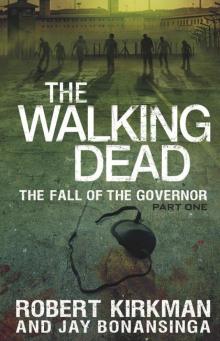 The Walking Dead
The Walking Dead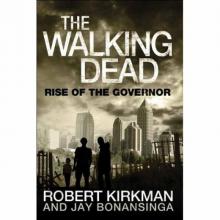 Descent
Descent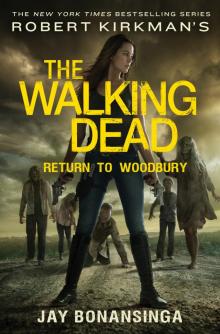 The Walking Dead: Return to Woodbury
The Walking Dead: Return to Woodbury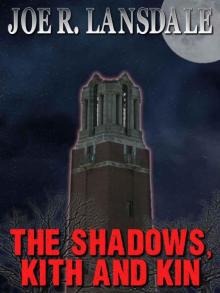 The Killer's Game
The Killer's Game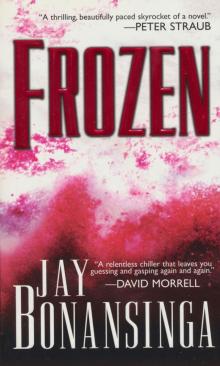 Frozen
Frozen Shattered
Shattered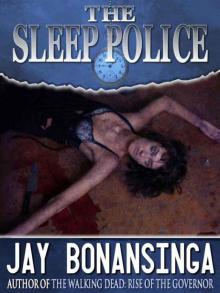 The Sleep Police
The Sleep Police Perfect Victim
Perfect Victim